完整版小学英语一般现在时三单动词的变化规则及练习题
动词第三人称单数的变化规则及练习
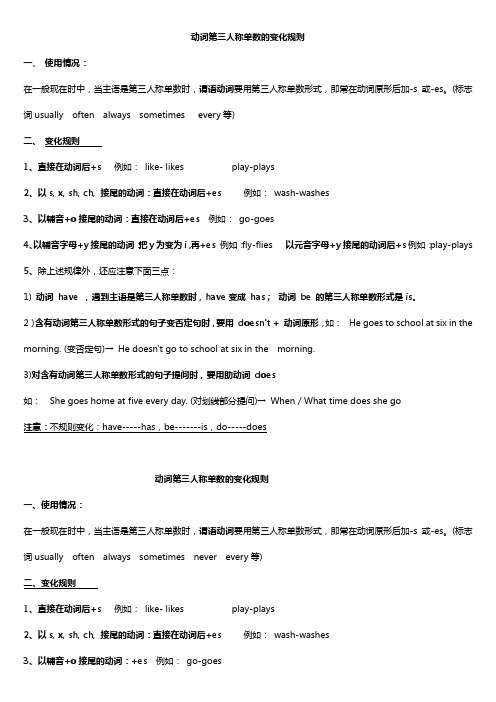
动词第三人称单数的变化规则一、使用情况:在一般现在时中,当主语是第三人称单数时,谓语动词要用第三人称单数形式,即常在动词原形后加-s或-es。
(标志词usually often always sometimes every等)二、变化规则1、直接在动词后+s 例如:like- likes play-plays2、以s, x, sh, ch, 接尾的动词:直接在动词后+es 例如:wash-washes3、以辅音+o接尾的动词:直接在动词后+es 例如:go-goes4、以辅音字母+y接尾的动词:把y为变为i,再+es 例如:fly-flies 以元音字母+y接尾的动词后+s例如:play-plays5、除上述规律外,还应注意下面三点:1)动词have ,遇到主语是第三人称单数时,have变成has;动词be 的第三人称单数形式是is。
2)含有动词第三人称单数形式的句子变否定句时,要用doesn't + 动词原形,如:He goes to school at six in the morning. (变否定句)→He doesn't go to school at six in the morning.3)对含有动词第三人称单数形式的句子提问时,要用助动词does如:She goes home at five every day. (对划线部分提问)→When / What time does she go注意:不规则变化:have-----has,be-------is,do-----does动词第三人称单数的变化规则一、使用情况:在一般现在时中,当主语是第三人称单数时,谓语动词要用第三人称单数形式,即常在动词原形后加-s或-es。
(标志词usually often always sometimes never every等)二、变化规则1、直接在动词后+s 例如:like- likes play-plays2、以s, x, sh, ch, 接尾的动词:直接在动词后+es 例如:wash-washes3、以辅音+o接尾的动词:+es 例如:go-goes4、以辅音字母+y接尾的动词:把y变为i,再+es 例如:fly-flies 以元音字母+y接尾的动词后+s例如:play-plays5、除上述规律外,还应注意下面三点:1)动词have ,遇到主语是第三人称单数时,have变成has;动词be 的第三人称单数形式是is。
一般现在时动词第三人称单数变化规则讲义及试题

一般现在时动词第三人称单数变化规则讲义及试题一般现在时、第三人称单数动词变化规则一、概述一般现在时的概念和用法:1)表示现阶段经常、反复、习惯性的动作;2)表示目前的状况;3)表示自然界的客观真理。
二、一般现在时的结构时态的结构指的是动词的变化形式。
一般现在时间有两种结构一种是动词原形用于主语为非第三人称时的情况;另一种为动词的第三人称单数形式用于主语为第三人称时的情况。
Eg1.Weoftengetupearlyinthemorning.Eg2.Myfatheroftengetsupearlyinthemorning.三、谈谈“主语为三单其后动词s添”在一般现在时中当主语为第三人称单数时谓语动词要用第三人称单数形式。
可以简单叙述为“主语为三单其后动词s 添”。
何谓第三人称单数?用一句话概括就是“非你、非我、非复数”如he,she,it, myfather, mymother,mysister, ourEnglishteacher, Tom,Mike,LiuJia,China,mybook,etc.Eg3.Hesometimesgoestoschoolbybike.Eg4.Myfatherworksinthehospitalasadoctor.1四、一般现在时的肯定句中主语为第三人称单数的动词变化主要体现在词尾的变化上其规律为:(与名词变成复数的变法大致相同。
)规则原形第三人称单数形式1、一般情况下直接在动词词getgetstakes尾+splayplaysguessguesses2、以s,x,sh,ch,o结尾的动词fixfixesfinishfinishes在词尾+esteachteachesgo和dogoes和doesstudystudies3、以辅音字母+y结尾的动词tryflyflies先把y变为i再加escarrycarriesworryworries4、不规则动词(特殊情况)havehasbeis五、一般现在时的句子转换(1)当句子中有be动词或情态动词时则把be动词或情态动词(can,could 等等)提到主语的前面变成一般疑问句;在be动词或情态动词后面加not变成否定句.例:①陈述句:Sheisastudent.2一般疑问句→Issheastudent?否定句→Sheisnotastudent.②陈述句:Icanswim.一般疑问句→Canyouswim否定句→Icannotswim.(2)当句子中即没有be动词也没有情态动词时则在主语前加助动词do(you,以及复数),does(单数she,he,it)变成一般疑问句;在主语后谓语动词前加助动词don’t(I,you,以及复数),doesn’t(单数she,he,it)变成否定句助动词后的动词要变成动词原形。
小学英语一般现在时三单动词的变化规则及练习题(1)

一般现在时三单动词的变化规则及练习题1.一般情况下,直接加-s 2.以s. x. sh. ch. o结尾,加-es 3.以“辅音字母+y”结尾,变y为i, 再加-es一、写出下列动词的第三人称单数drink ________ go _______ stay ________ make ________ look _____ ____ have_______ pass_______ carry ____ come________ watch___ ___ sing_______ fly ________ study_______ brush________ do_______ __ teach_______二、用括号内动词的适当形式填空。
1. He often ________(have) dinner at home.2. Daniel and Tommy ___ ____(be) in Class One.3. We _______(not watch) TV on Monday.4. N ick _______(not go) to the zoo on Sunday.5. What _______they often _______(do) on Sundays?6. _______ your mother _______(read) newspapers every day?7. Mike _______(like) cooking. 8. I _______(be) ill. I’m in bed. 9. Liu Tao _______(do) not like PE. 10. The child often ____ ___(watch) TV in the evening.三、按照要求改写句子1. He watches TV every evening.(改为否定句)___________________________________________________2. I do my homework every day.(改为一般疑问句,作否定回答) ________________________________________________3. She likes books.(改为一般疑问句,做肯定回答)_______________________________________________________ 4. Amy likes playing computer games.(改为一般疑问句,作否定回答) _______________________________________________________ _5. We go to school on Sundays.(改为否定句)_______________________________________________________四、改错(划出错误的地方,将正确的写在横线上)1. Is your brother like English? __________________2. Does he likes swimming? __________________3. He likes play games. __________________4. She don’t do her homework on Sundays. _________________五、把句子补充完整。
完整版)小学一般现在时练习题和答案
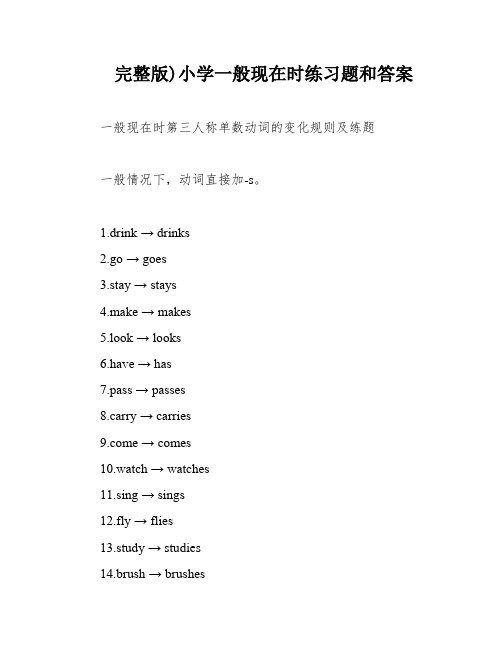
完整版)小学一般现在时练习题和答案一般现在时第三人称单数动词的变化规则及练题一般情况下,动词直接加-s。
1.drink → drinks2.go → goes3.stay → stays4.make → makes5.look → looks6.have → has7.pass → passes8.carry → carriese → comes10.watch → watches11.sing → sings12.fly → flies13.study → studies14.brush → brushes15.do → does16.teach → teaches练题:1.He often has dinner at home.2.Daniel and Tommy are in Class One.3.We do not watch TV on Monday.4.Nick does not go to the zoo on Sunday.5.What do they often do on Sundays?6.Does your mother read newspapers every day?7.Mike likes cooking.8.I am ill。
I'm in bed.9.Liu Tao does not like PE.10.The child often watches TV in the evening.Do you like running?1.Does he like jumping?2.Does Nancy grow flowers on Saturdays?3.The teachers like dancing.4.The teacher likes to dance.5.The students speak English in class.6.The student speaks Chinese after class.7.Let's go and play football.8.He does not like swimming.9.I'm sorry to hear that.三、按照要求改写句子1.He does not watch TV every evening.2.Do you do your homework every day。
小学英语一般现在时三单动词的变化规则及练习题

在句子中,一般现在时三单动词的变化规则可以用来描述事实、表达观点 或传达信息。
通过使用一般现在时三单动词的变化规则,可以使句子更加简洁、明了, 易于理解。
在英语学习中,掌握一般现在时三单动词的变化规则在实际中的应用非常 重要,可以提高语言表达能力。
一般现在时三单 动词的变化练习
题
单选练习题
一般现在时态中,动词第三人称单数的变化规则是:A. 动词原形 B. 动词+s C. 动词+es D. 动词+ing
下列句子中,动词形式正确的是:A. He like playing basketball B. She goes to school at 7:00 every day C. They like to eat apples D. We don't like to play in the rain
在日常交流中的应用
描述日常行为和习惯
表达经常发生的动作或状态
描述事物的性质和特征
表达个人的喜好和意愿
在写作中的应用
描述日常行为和习惯
表达个人观点和喜好
描述事件和经历
编写故事和虚构情境
感谢您的观看
汇报人:XX
下列句子中,动词形式不正确的是:A. He plays basketball every day B. She eats an apple every morning C. They like eat apples D. We don't like to play in the rain
下列句子中,动词形式正确的是:A. He doesn't like to eat vegetables B. She doesn't like playing the piano C. They don't like to read books D. We don't like eating apples
完整版)三单形式练习题

完整版)三单形式练习题三单动词的变化规则一般情况下,动词直接加-s。
以s。
x。
sh。
ch。
o结尾的动词,加-es。
以辅音字母+y结尾的动词,变y为i,再加-es。
一般现在时用法专练:1.写出下列动词的第三人称单数drink drinks go goes stay stays make XXXlook looks have has pass passes carry carriesXXXXXX XXX2.用括号内动词的适当形式填空。
1.He often has (have) dinner at home.2.Daniel and Tommy are (be) in Class One.3.We do not watch (not watch) TV on Monday.4.Nick does not go (not go) to the zoo on Sunday.5.Do they like (like) the World Cup?6.What do they often do (do) on Saturdays?7.Do your parents read (read) newspapers every day?8.XXX (teach) us English on Sundays.9.She and I take (take) a walk XXX.10.There is (be) some water in the bottle.11.XXX XXX (like) cooking.12.They have (have) the same hobby.13.My aunt looks after (look after) her baby carefully.14.You always do (do) your homework well.1.I am XXX.2.XXX Friday.3.Liu Tao does not enjoy PE.4.XXX child XXX.5.Su Hai and Su Yang have eight lessons this term.6.Today is Saturday.1.Daniel does not watch TV every evening.2.Do you do your homework every day。
小学英语一般现在时三单动词的变化规则及练习题
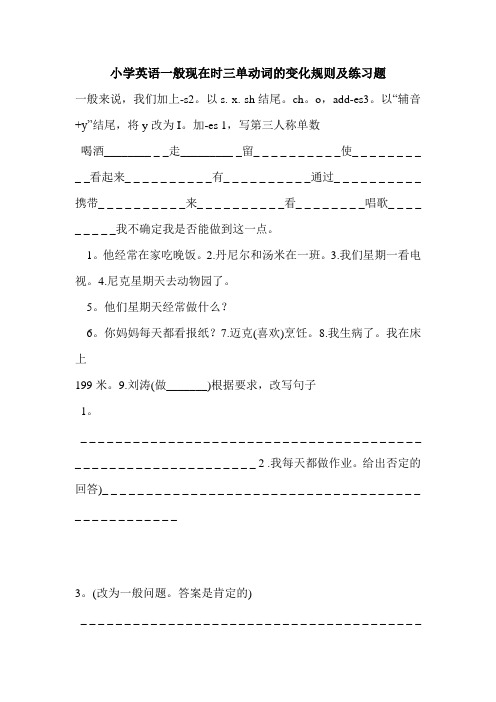
小学英语一般现在时三单动词的变化规则及练习题一般来说,我们加上-s2。
以s. x. sh结尾。
ch。
o,add-es3。
以“辅音+y”结尾,将y改为I。
加-es 1,写第三人称单数喝酒________ _ _走_________ _留_ _ _ _ _ _ _ _ _ _使_ _ _ _ _ _ _ _ _ _看起来_ _ _ _ _ _ _ _ _ _有_ _ _ _ _ _ _ _ _ _通过_ _ _ _ _ _ _ _ _ _携带_ _ _ _ _ _ _ _ _ _来_ _ _ _ _ _ _ _ _ _看_ _ _ _ _ _ _ _唱歌_ _ _ _ _ _ _ _ _我不确定我是否能做到这一点。
1。
他经常在家吃晚饭。
2.丹尼尔和汤米在一班。
3.我们星期一看电视。
4.尼克星期天去动物园了。
5。
他们星期天经常做什么?6。
你妈妈每天都看报纸?7.迈克(喜欢)烹饪。
8.我生病了。
我在床上199米。
9.刘涛(做_______)根据要求,改写句子1。
_ _ _ _ _ _ _ _ _ _ _ _ _ _ _ _ _ _ _ _ _ _ _ _ _ _ _ _ _ _ _ _ _ _ _ _ _ _ _ _ _ _ _ _ _ _ _ _ _ _ _ _ _ _ _ _ _ _ _ _ 2 .我每天都做作业。
给出否定的回答)_ _ _ _ _ _ _ _ _ _ _ _ _ _ _ _ _ _ _ _ _ _ _ _ _ _ _ _ _ _ _ _ _ _ _ _ _ _ _ _ _ _ _ _ _ _ _ _3。
(改为一般问题。
答案是肯定的)_ _ _ _ _ _ _ _ _ _ _ _ _ _ _ _ _ _ _ _ _ _ _ _ _ _ _ _ _ _ _ _ _ _ _ _ _ _ __ _ _ _ _ _ _ _ _ _ _ _ _ _ _ 4。
艾米喜欢玩电脑游戏。
给出否定的回答)_ _ _ _ _ _ _ _ _ _ _ _ _ _ _ _ _ _ _ _ _ _ _ _ _ _ _ _ _ _ _ _ _ _ _ _ _ _ _ _ _ _ _ _ _ _ _ _5 .我们星期天去上学(改为否定句)_ _ _ _ _ _ _ _ _ _ _ _ _ _ _ _ _ _ _ _ _ _ _ _ _ _ _ _ _ _ _ _ _ _ _ _ _ _ _ _ _ _ _ _ _ _ _ _ _ _ _ _ _ _ _ _ _ _ _ _ _ _ _ _ _ _ _ _ _ _ _ _ _ _ _ _ _ _ _ _ _ _ _ _ _ _ _ _ _ _ _ _ _ _ _ _ _ _ _ _ _ _ _ _ _ _ _ _ _ _ _ _ _ _ _ _ _ _ _ _ _ _ _ _ _ _ _ _ _ _ _ _ _ _ _ _ _ _ _ _ _ _ _ _ _ _ _ _ _ _ _ _ _ _ _ _ _ _ _ _ _ _ _ _ _ _ _ _ _ _ _ _ _ _ _ _ _ _ _ _ _ _ _ _ _ _ _ _ _ _ _ _ _ _ _ _ _ _ _ _ _ _ _ _ _ _ _ _ _ _ _ _ _ _ _ _ _ _ _ _ _ _ _ _ _ _ _ _ _ _ _ _ _ _ _ _ _ _ _ _ _ _ _ _ _ _ _ _ _ _ _ _ _ _ _ _ _ _ _ _ _ _ _ _ _ _ _ 2。
(完整版)小学英语四种时态知识点加练习

小学英语四种时态知识点加练习一、一般现在时一. 意义:表示经常发生的事情,动作或存在的状态二. 构成及变化1.be动词的变化。
肯定句:主语+be(am,is,are)+其它。
如:I am a boy.我是一个男孩。
否定句:主语+ be + not +其它。
如:He is not a worker.他不是工人。
一般疑问句:Be +主语+其它。
如:-Are you a student? -Yes. I am. / No, I'm not.特殊疑问句:疑问词+一般疑问句。
如:Where is my bike?2. 行为动词的变化。
l、当主语为第一,二人称及复数时,助动词为do肯定句:主语+动词原形(+其它)。
如:We often play basketball after school.否定句:主语+ don't+动词原形(+其它)。
如:we don’t play basketball after school.一般疑问句:Do +主语+动词原形+其它?如:Do you often play basketball after school? Yes, we do. / No, we don't.特殊疑问句:疑问词+以do开头的一般疑问句?如:What do you often do after school ?2、当主语为第三人称单数时,助动词为does肯定句:主语+动词三单式(+其它)。
如:He swims well.否定句:主语+ doesn’t+动词原形(+其它)。
如:He doesn’t swim well..一般疑问句:Does +主语+动词原形+其它。
如:Does he swim well ?Yes, he does. / No, he doesn't.特殊疑问句:疑问词+以does开头的一般疑问句?如:How does your father go to work?三.第三人称单数的动词变化规则(只有在第三人称为主语的肯定句中,动词才用三单式)(1)多数动词直接加s: runs gets likes collets takes plays climbs…….(2)结尾是s, x, sh, ch, o,前为辅音字母, 结尾加es :watches teaches goes does washes crosses mixes brushes(3)动词末尾y前为辅音:将y改为i加es: study→studies fly→flies carry→carries cry→cries但在y前如果为元音则直接加s:buys says四.时间标志:always , usually , often , sometimes ,every…一般现在时练习题I.用下列单词的适当形式填空1.We often___________(play) in the playground.2.He _________(get) up at six o’clock.3.__________you _________(brush) your teeth every morning?4.What________________(do) he usually________________(do) after school?5.Danny ________________(study) English, Chinese, maths, science and Art at school.6.Mike sometimes __________(go) to the park with his sister.7.At eight at night, she __________(watch) TV with his parents.8.________ Mike________(read) English every day?9.How many lessons_________your classmates________(have) on Monday?10.What time_________his mother_________(do) the housework?II.改句子1.Do you often play football after school? (改为肯定句)2.I have many books.(改为否定句)3.Gao Shan’s sister likes playing table tennis (改为否定句)4.She lives in a small town near New York.(改为一般疑问句)5.I watch TV every day.(改为一般疑问句)6.We have four lessons.(改为否定句)7.Nancy doesn’t run fast (改为肯定句)二、现在进行时一、概念现在进行时表示说话时正在进行或发生的动作,也可表示当前一段时间内的活动或现阶段正在进行的动作。
小学英语语法时态归纳及练习(含答案解析)

英语时态归纳一、一般现在时:标志词:often(经常) sometimes(有时) always(总是) usually(通常) never(从不) every(每一)行为动词词型变化形式:一般现在时动词只有第三人称有词形变化;其他人称(第一人称:I, we;第二人称:you;第三人称复数:they、my friends)动词均用原形。
当主语是第三人称单数时,一般动词在一般现在时句子中的变化规律:1、多数在动词后加s:play—plays like—likes ,2、以s,x,sh,ch,o结尾的动词加es wash–washes catch–catches do–does3、以辅音字母加y结尾,把y改i再加es fly—flies study—studies4、以元音字母加y结尾,直接加s buy – buys5、不规则变化have—has一般现在时基本用法功能1.表示事物或人物的特征、状态。
如:The sky is blue.天空是蓝色的。
2.表示经常性或习惯性的动作。
如:I get up at six every day.我每天六点起床。
3.表示客观现实。
如:The earth goes around the sun.地球绕着太阳转。
The earth is round.构成1. be动词:主语+be(am,is,are)+其它。
如:I am a boy.我是一个男孩。
2.行为动词:主语+行为动词(+其它)。
如:We study English.我们学习英语。
句型肯定句:A.be动词:主语+ be + 其它成分He is a worker.B.行为动词:主语+动词(注意人称变化) +其它成分We like the little cat.否定句:A.be动词:主语+ be + not+其它成分They are not students.B.行为动词:主语+助动词(do/does) + not+动词原形+其它成分We don’t like the little cat.一般疑问句:A.be动词:Am / Is /Are +主语+ 其它成分Are you a teacher? Yes, I am. / No, I am not.Are they students of your school. Yes, they are / No they aren’t.B.行为动词:助动词(Do/Does)+主语+动词原形+ 其它成分Do you like it? Yes, I do. / No. I don’t .Does he(she) like it? Yes, he( she )does. / No, he ( she )doesn’t.特殊疑问句:疑问词+ 一般疑问句A.be动词:How many students are there in your school?B.行为动词:What do you usually do on Sunday?一般现在时动词be和have的变化形式1.动词Be 叫连系动词, 用法:第一人称单数用am,第三人称单数用is,其它人称用are。
最新一般现在时态及第三人称单数(附练习及答案)
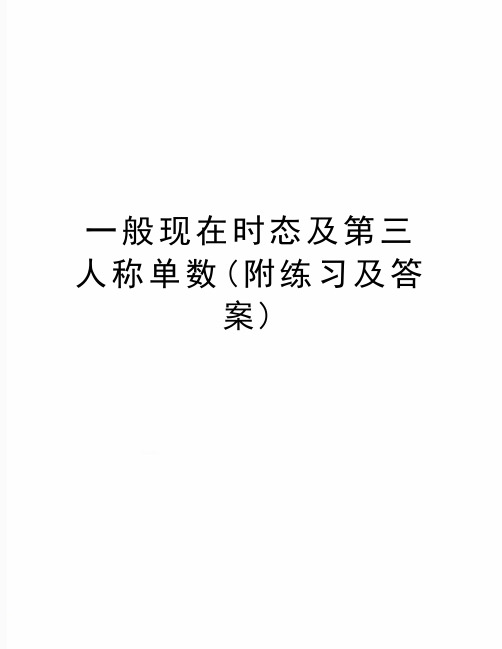
一般现在时态及第三人称单数(附练习及答案)一般现在时态及第三人称单数(附练习及答案)第三人称单数问题一般现在时中,当主语是第三人称单数时,即常在动词原形后加-s或-es。
第三人称单数变化,现归纳总结如下:1.人称代词he, she, it是第三人称单数。
如:He likes watching TV.他喜欢看电视。
She has lunch at twelve.她十二点吃午餐。
It looks like a cat.它看起来像只猫。
2.单个人名、地名或称呼作主语;用第三人称单数。
如:①Han Mei looks like her mother.韩梅看起来像她的母亲。
②Beijing is in China.北京在中国。
③Uncle Wang often makes cakes.王叔叔经常做蛋糕。
3.单数可数名词或"this / that / the/ a +单数可数名词"作主语时,是第三人称单数。
如:①A horse is a useful animal.马是有用的动物。
②This book is yours.这本书是你的。
③That car is red.那辆小汽车是红色的。
④The cat is Lucy's.这只猫是露茜的。
4.不定代词someone, somebody, nobody, everything, something等及指示代词this, that作主语时,第三人称单数。
①Everyone is here.大家到齐了。
②There is something wrong with the watch.这块手表有毛病。
③This is a pen.这是一支钢笔。
④That is an eraser.那是一块橡皮擦。
5.不可数名词作主语时为第三人称单数。
如:①The milk is in the glass. ②The bread is very small.6.当数字或字母作主语时,看作第三人称单数。
小学英语语法一般现在时(包括练习)
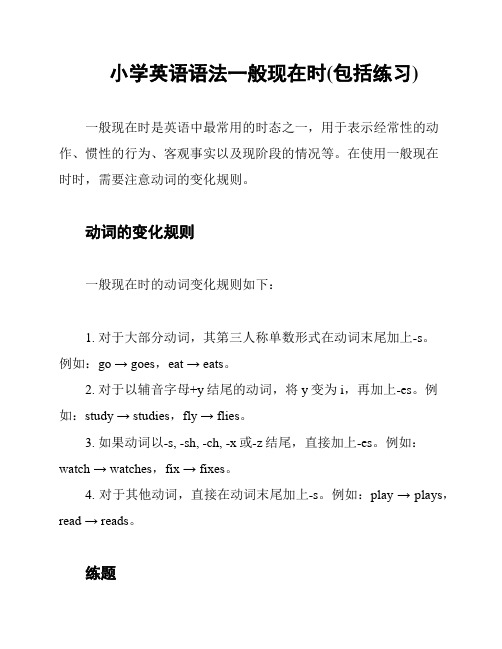
小学英语语法一般现在时(包括练习)一般现在时是英语中最常用的时态之一,用于表示经常性的动作、惯性的行为、客观事实以及现阶段的情况等。
在使用一般现在时时,需要注意动词的变化规则。
动词的变化规则一般现在时的动词变化规则如下:1. 对于大部分动词,其第三人称单数形式在动词末尾加上-s。
例如:go → goes,eat → eats。
2. 对于以辅音字母+y结尾的动词,将y变为i,再加上-es。
例如:study → studies,fly → flies。
3. 如果动词以-s, -sh, -ch, -x或-z结尾,直接加上-es。
例如:watch → watches,fix → fixes。
4. 对于其他动词,直接在动词末尾加上-s。
例如:play → plays,read → reads。
练题请根据句子的语境,用适当的动词形式填空。
每个空格只填一个单词。
1. Peter ___________ (like) to play basketball with his friends every weekend.2. My mother ___________ (work) as a nurse in the hospital.3. The cat ___________ (sleep) on the sofa most of the day.4. We ___________ (watch) movies at the cinema every Friday night.5. Sarah ___________ (brush) her teeth twice a day.参考答案1. Peter likes to play basketball with his friends every weekend.2. My mother works as a nurse in the hospital.3. The cat sleeps on the sofa most of the day.4. We watch movies at the cinema every Friday night.5. Sarah brushes her teeth twice a day.以上是关于小学英语语法一般现在时以及练习题的内容。
一般现在时主语三单的动词变化及练习

一般如今时主语单三人称时的动词变更【1 】①在一般如今时中,当主语为第三人称单数时,动词要用“s”型(即第三人称单数情势).②所谓动词“s”型的组成,与名词变复数类似,即:a)在动词尾直接加 s.如:play—plays, want—wants, work—works, know—knows, help—helps,get—getsb)以字母s.ss.x.ch.sh或o结尾的动词加es;如:guess—guesses, fix—fixes, teach—teaches, brush—brushes, go—goes,do—does,watch—watches,catch—catches c)以子音字母+y结尾的动词,先变y为i,再加es.如:study—studies,carry—carries,fly—flies,worry—worries第三人称单数演习一.请选出准确的答案:1. She (like / likes) to play football.2. He (like / likes) drinking milk.3. I (like / likes) to watch TV.4. We (like / likes) to play badminton.5. They (like / likes) to sing songs.6. She (read / reads) books every day.7. He (play / plays) computer games every day.8. It (listen / listens) to the radio every day.9. Linda (draw / draws) pictures every day.10. Jane and Linda (play / plays) football every day.二.请用动词的恰当情势填空.1.Let him _____(play)basketball.2.Everyone_____(know)what he really like.3.Those girls____(be)my sister.4.That girl_____(call)me every Sunday.5.How___(do)she_____(spell)the word?6. He________ TV every evening. (watch)7. We always ________ to school on foot. (go)8. Tom, with his classmates, often ______ football after school. (play)9. Your shoes _______ under the bed. (be)10. ______ here and ______ by me. (come, stand)11. His uncle usually _________ to work by bus. (go)12. I always ______ up at six in the morning.(get)13. John ________ like his father. (look)三.请用 have或has填空.1.I ________ a nice picture.2.He ________ a good friend.3.They _________ some kites.4.We ________ some flowers.5.She __________ a duck.6.My father __________ a new bike.7.Her mother _________ a vase.8.Our teacher _________ an English book.9.Our teachers _________ a basketball.10.Their parents __________ some story books.11.Nancy _______ many skirts.12.David ________ some jackets.13.My friends ________ a football.14.What do you ________ ?15.What does Mike ________ ?四.否认句:在动词前+doesn't或don't.1.She_____ _____(do)her homework every day.2.He_____ _____(live)in Shanghai.3.He_____ _____(need)a pair pf shoes.4.Danny_____ _____(see)the apple tree?5.She_____ _____(come)from America.6.The girl_____ _____(look)out of the window and sees many birds in the sky.五.Do照样Does我来选.1. [Do/Does]______ he watch TV at night? Yes he does.2. [Do/Does]______ you go to school everyday? No, I don’t.3. [Do/Does]______ Jack and Peter like apples?4. [Do/Does]______ Tina go swimming on Sunday?5. [Do/Does]______they play football? Yes, they ___[do/does].6. [Do/Does]______ we have a good teacher? Yes, we ____[do/does].7. [Do/Does]_____ they jump rope ? No, they ___[do not/does not].8. [Do/Does]_____your dog walk in the zoo?9. [Do/Does]____ I have a big nose? No, you _____[do not/does not].10. [Do/Does]____ your cats eat fish? Yes, they _____.[do/does].11. [Do/Does]_____ their mothers go shopping? No, they ____[do not/does not].12. I ___[do not/ does not] speak Japanese. [Do/Does] _____you speak Japanese?六.请用动词的恰当情势填空.1._____the desk_____(have)four legs?Yes,it does.2._____she____(do)her homework every day?Yes,she does.3._____he_____(live)in Jinan?No,he doesn't.4._____he_____(need)a pair of shoes?NO,he doesn't.5.Does Danny_____(see)the apple tree?6._____she_____(come)from America?Yes,she_____.7._____the girl_____(look)out of the window and sees many birds in the sky? No,she_____.8. Jenny runs home and_____(sit)on the chair?七.选择题:1. I _____ to school every day.A. goB. goesC. going2. He _____ teeth every morning.A. brushB. brushesC. brushing3. The birds_____ singing.A. likeB. likesC. like to4. What does Lily _____ doing?A. likeB. likesC. to5. _____ you like eating apples?A. DoB. DoesC. Doing6. _____ he swim every afternoon?A. DoB. DoesC. Doing7. Tom likes _____ in the classroom.A. singingB. singC. to singing8. –Does Sally like swimming?No, she .A. doB. doesC. doesn’t9. Peter and Mary _____ milk every day.A. drinkB. drinkingC. drinks10. _____ they read English every day?A. DoesB. AreC. Do八.把下列句子变成否认句:1. She draws pictures every day.2. We like playing football.九.把下列句子变成一般疑问句,并做确定答复.1. Linda swims every day.2. They like playing games.。
小学一般现在时练习题和答案
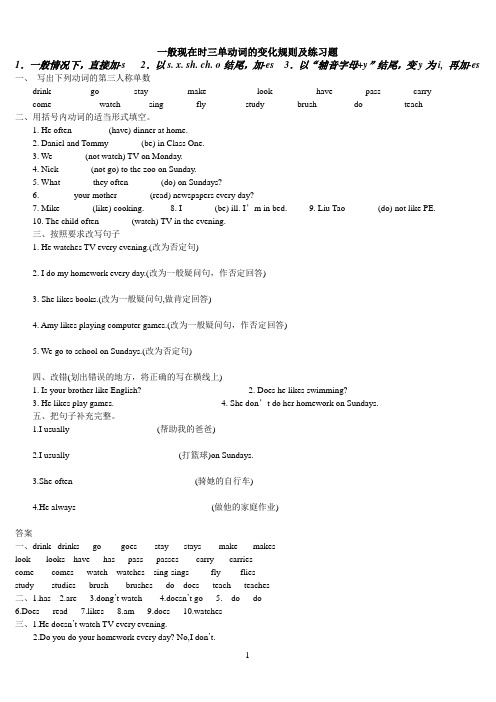
一般现在时三单动词的变化规则及练习题1.一般情况下,直接加-s 2.以s. x. sh. ch. o结尾,加-es 3.以“辅音字母+y”结尾,变y为i, 再加-es 一、写出下列动词的第三人称单数drink ________ go _______ stay ________ make ________ look _________ have_______ pass_______ carry ____come________ watch______ sing_______ fly ________ study_______ brush________ do_________ teach_______二、用括号内动词的适当形式填空。
1. He often ________(have) dinner at home.2. Daniel and Tommy _______(be) in Class One.3. We _______(not watch) TV on Monday.4. Nick _______(not go) to the zoo on Sunday.5. What _______they often _______(do) on Sundays?6. _______ your mother _______(read) newspapers every day?7. Mike _______(like) cooking. 8. I _______(be) ill. I’m in bed. 9. Liu Tao _______(do) not like PE.10. The child often _______(watch) TV in the evening.三、按照要求改写句子1. He watches TV every evening.(改为否定句)___________________________________________________2. I do my homework every day.(改为一般疑问句,作否定回答)________________________________________________3. She likes books.(改为一般疑问句,做肯定回答)_______________________________________________________4. Amy likes playing computer games.(改为一般疑问句,作否定回答)________________________________________________________5. We go to school on Sundays.(改为否定句)_______________________________________________________四、改错(划出错误的地方,将正确的写在横线上)1. Is your brother like English? __________________2. Does he likes swimming? __________________3. He likes play games. __________________4. She don’t do her homework on Sundays. _________________五、把句子补充完整。
小学英语一般现在时三单动词的变化规则及练习题

一般现在时三单动词的变化规则及练习题1.一般情况下,直接加-s 2.以s. x. sh. ch. o结尾,加-es 3.以“辅音字母+y”结尾,变y为i, 再加-es一、写出下列动词的第三人称单数drink ________ go _______ stay ________ make ________ look _____ ____ have_______ pass_______ carry ____ come________ watch___ ___ sing_______ fly ________ study_______ brush________ do_______ __ teach_______二、用括号内动词的适当形式填空。
1. He often ________(have) dinner at home.2. Daniel and Tommy ___ ____(be) in Class One.3. We _______(not watch) TV on Monday.4. N ick _______(not go) to the zoo on Sunday.5. What _______they often _______(do) on Sundays?6. _______ your mother _______(read) newspapers every day?7. Mike _______(like) cooking. 8. I _______(be) ill. I’m in bed. 9. Liu Tao _______(do) not like PE. 10. The child often ____ ___(watch) TV in the evening.三、按照要求改写句子1. He watches TV every evening.(改为否定句)___________________________________________________2. I do my homework every day.(改为一般疑问句,作否定回答) ________________________________________________3. She likes books.(改为一般疑问句,做肯定回答)_______________________________________________________ 4. Amy likes playing computer games.(改为一般疑问句,作否定回答) _______________________________________________________ _5. We go to school on Sundays.(改为否定句)_______________________________________________________四、改错(划出错误的地方,将正确的写在横线上)1. Is your brother like English? __________________2. Does he likes swimming? __________________3. He likes play games. __________________4. She don’t do her homework on Sundays. _________________五、把句子补充完整。
小学英一般现在时讲解和练习

小学英语一般现在时一. 意义:表示经常发生的事情,动作或存在的状态二. 构成及变化1.be动词的变化。
肯定句:主语+be(am,is,are)+其它。
如:I am a boy.我是一个男孩。
否定句:主语+ be + not +其它。
如:He is not a worker.他不是工人。
一般疑问句:Be +主语+其它。
如:-Are you a student? -Yes. I am. / No, I'm not.特殊疑问句:疑问词+一般疑问句。
如:Where is my bike?2. 行为动词的变化。
l、当主语为第一,二人称及复数时,助动词为do肯定句:主语+动词原形(+其它)。
如:We often play basketball after school.否定句:主语+ don't+动词原形(+其它)。
如:we don’t play basketball after school.一般疑问句:Do +主语+动词原形+其它?如: Do you often play basketball after school l? Yes, we do. / No, we don't.特殊疑问句:疑问词+以do开头的一般疑问句?如: What do you often do after school ?2、当主语为第三人称单数时 ,助动词为does肯定句:主语+动词三单式(+其它)。
如: He swims well.否定句:主语+ doesn’t+动词原形(+其它)。
如:He doesn’t swim well..一般疑问句:Does +主语+动词原形+其它。
如:Does he swim well ?Yes, he does. / No, he doesn't.特殊疑问句:疑问词+以does开头的一般疑问句?如: How does your father go to work?三.第三人称单数的动词变化规则(只有在第三人称为主语的肯定句中,动词才用三单式)(1)多数动词直接加s: runs gets likes collets takes plays climbs…….(2)结尾是s, x, sh, ch, o,前为辅音字母,结尾加es : watches teaches goes does washes crosses mixes brushes(3)动词末尾y前为辅音:将y改为i加es: study→studies fly→fliescarry→carriescry→cries但在y前如果为元音则直接加s: buys says四.时间标志:always , usually , often , sometimes ,every…一般现在时练习题(1)I.用下列单词的适当形式填空1.We often___________(play) in the playground.2.He _________(get) up at s ix o’clock.3.__________you _________(brush) your teeth every morning?4.What________________(do) he usually________________(do) after school?5.Danny ________________(study) English, Chinese, maths, science and Art at school.6.Mike sometimes __________(go) to the park with his sister.7.At eight at night, she __________(watch) TV with his parents.8.________ Mike________(read) English every day?9.How many lessons_________your classmates________(have) on Monday?10.What time_________his mother_________(do) the housework?II.改句子1.Do you often play football after school? (改为肯定句)2.I have many books.(改为否定句)3.Gao Shan’s sister likes playing table tennis (改为否定句)4.She lives in a small town near New York.(改为一般疑问句)5.I watch TV every day.(改为一般疑问句)6.We have four lessons.(改为否定句)7.Nancy doesn’t run fast (改为肯定句)8.My dog runs fast.否定句:一般疑问句:9.Mike has two letters for him.一般疑问句:否定句:10.I usually play football on Friday afternoon.否定句:一般疑问句:划线提问11.Su Yang usually washes some clothes on Saturday.否定句:一般疑问句:划线提问:12.Mingming usually waters the flowers every day.否定句:一般疑问句:13.Tom does his homework at home.否定句:一般疑问句:一般现在时练习题(2)一、用所给动词的真确形式填空1.I like ____________ (swim).2.He _________(read) English every day.3.We _________(go)to school at seven in the morning.4.Mike________(go)to school at seven in the morning.5.My mother________(like) ______(go) shopping.6.I can ________(draw) many beautiful pictures.7.She_________(make) a model plane.8.Do you ________(like)_________(run)?9.Does he_________(like)_________(jump) ?10.Does Nancy_________(grow)flowers on Saturday ?11.The teachers________(like)___________(dance).12.The teacher________(like)____________(dance).13.The students___________(speak) English in class.14.The student_________(speak) Chinese after class.15. Let’s____________and play football . ( go )16. He_____________ like swimming . ( not )17. I’m sorry ____________that . ( hear )18. Wang Bing is____________ ( write ) an E-mail to his friend .19. He has_____________a headache . ( get )20. _________you study English at school ? Yes , I___________. ( do )21. __________your sister study English at school ? No , she__________ . ( do )22. I’m _________ better . ( feel )23. Why__________Tom absent today ? ( be )二、用所给的人称改写句子1.I take photos on Sunday. ( Mike)2.We grow beautiful flowers. (she)3.They like collecting stamps. (Ben)4.I listen to music carefully. (my aunt)5.You like making a model ship. (Helen)6.We clean the classroom every day. (he)7.They look after the pandas. (Mr Wang)8.I draw a tree and some flowers. (Nancy)9.We go to bed at eight. ( my sister)10.I read newspapers in the evening. (Mr Green)一般现在时练习一、写出下列动词的第三人称单数talk______forget______hope______stop______perform______play______say______buy______worry______fly______study_______like_______make______take______love_______recite_______become_______come_______drive_______shine_______leave_____wake_______ride_______write_______hike______give______see______swim______stop______shop_______plan______get_______s it_______let_______cut_______run_______forget_______begin_______wash_____watch_______finish______teach_____fish_______reach_______go_______do_____二、用括号内动词的适当形式填空。
小学一般现在时练习题和答案
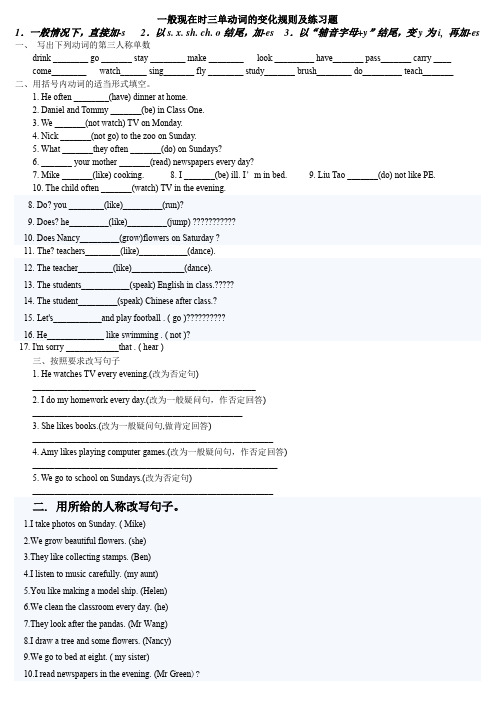
一般现在时三单动词的变化规则及练习题1.一般情况下,直接加-s 2.以s. x. sh. ch. o结尾,加-es 3.以“辅音字母+y”结尾,变y为i, 再加-es 一、写出下列动词的第三人称单数drink ________ go _______ stay ________ make ________ look _________ have_______ pass_______ carry ____come________ watch______ sing_______ fly ________ study_______ brush________ do_________ teach_______二、用括号内动词的适当形式填空。
1. He often ________(have) dinner at home.2. Daniel and Tommy _______(be) in Class One.3. We _______(not watch) TV on Monday.4. Nick _______(not go) to the zoo on Sunday.5. What _______they often _______(do) on Sundays?6. _______ your mother _______(read) newspapers every day?7. Mike _______(like) cooking. 8. I _______(be) ill. I’m in bed. 9. Liu Tao _______(do) not like PE.10. The child often _______(watch) TV in the evening.8. Do? you ________(like)_________(run)?9. Does? he_________(like)_________(jump) ???????????10. Does Nancy_________(grow)flowers on Saturday ?11. The? teachers________(like)___________(dance).12. The teacher________(like)____________(dance).13. The students___________(speak) English in class.?????14. The student_________(speak) Chinese after class.?15. Let's___________and play football . ( go )??????????16. He_____________ like swimming . ( not )?17. I'm sorry ____________that . ( hear )三、按照要求改写句子1. He watches TV every evening.(改为否定句)___________________________________________________2. I do my homework every day.(改为一般疑问句,作否定回答)________________________________________________3. She likes books.(改为一般疑问句,做肯定回答)_______________________________________________________4. Amy likes playing computer games.(改为一般疑问句,作否定回答)________________________________________________________5. We go to school on Sundays.(改为否定句)_______________________________________________________二. 用所给的人称改写句子。
动词单三变化规律及练习题(小学五年级)
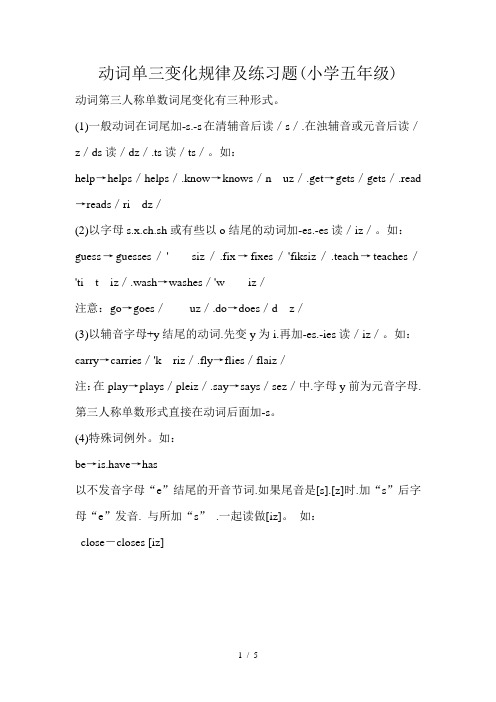
动词单三变化规律及练习题(小学五年级)动词第三人称单数词尾变化有三种形式。
(1)一般动词在词尾加-s.-s在清辅音后读/s/.在浊辅音或元音后读/z/ds读/dz/.ts读/ts/。
如:help→helps/helps/.know→knows/n uz/.get→gets/gets/.read →reads/ri dz/(2)以字母s.x.ch.sh或有些以o结尾的动词加-es.-es读/iz/。
如:guess→guesses/'siz/.fix→fixes/'fiksiz/.teach→teaches/'ti t iz/.wash→washes/'w iz/注意:go→goes/uz/.do→does/d z/(3)以辅音字母+y结尾的动词.先变y为i.再加-es.-ies读/iz/。
如:carry→carries/'k riz/.fly→flies/flaiz/注:在play→plays/pleiz/.say→says/sez/中.字母y前为元音字母.第三人称单数形式直接在动词后面加-s。
(4)特殊词例外。
如:be→is.have→has以不发音字母“e”结尾的开音节词.如果尾音是[s].[z]时.加“s”后字母“e”发音. 与所加“s”.一起读做[iz]。
如:close-closes [iz]一般现在时练习(一)一、用词的适当形式填空1.What time_________ his father_________(do) the work?2.He _________(get) up at five o’clock.3.__________ you _________(brush) your teeth every morning?4.What ________ ( do ) he usually ________( do ) after school?5.Tom ________ ( study ) English, Chinese, Maths, Science and Art at school.6. Kitty sometimes __________(go) to the park with his sister.7.At eight at night, she __________( watch ) TV with her parents.8. ________ Mike________( read ) English every day?9.How many lessons________ your classmates______( have ) on Monday?10.We often___________ ( play ) football in the playground.二、选择() 1. _____ you have a book?A. DoB. AreC. IsD. Have()2. They _________ on a farm.A. workingB. is workC. workD. is worked() 3. Does Peter like to watch TV?__________.A. Yes, he likeB. No, he doesn’tC. Yes, he’d likeD. No, he likes ()4. She doesn’t __________ her homework in the afternoon.A. doingB. to doC. doesD. do()5. How ____________ Mr. Brown ___________ to America?A. do,goB. is,goC. does,goD. does,goes()6. Where’s my camera? I____________ it.A. am not findingB. am not seeingC. can’t findD. can’t look at ()7. How ___________ he go to work?He ___________ to work by bike.A. does ;goB. do;goesC. do ;goD. does;goes()8. ______ you usually late for school?No, _____________.A. Do ; I amB. Does ;notC. Are ; I’m notD. Are ; I aren’t()9. _____ she _____ home at six every day?A. Is , leaveB. Does , leaveC. Is , leavesD. Does , left()10. Mr. Yang ____________ English this term.A.teaches ourB. teaches usC. teachs usD. teach our一般现在时练习(二)一、单项选择题1. Jenny ____ in an office. Her parents ____in a hospital.A. work worksB. works workC. work are workingD. is working work2. One of the boys_____ a black hat.A. haveB. there isC. there areD. has3. We will go shopping if it____ tomorrow.A. don't rainB. didn't rainC. doesn't rainD. isn't rain4. He said the sun ____in the east and ____in the west.A. rose; setB. rises; setsC. rises; setD. rise; sets5. Wang Mei ____ music and often ____ to music.A. like; listenB. likes; listensC. like; are listeningD. liking; listen6. Jenny____ English every evening.A. has studyB. studiesC. studyD. studied7. _____Mike from Japan?A. AreB. DoC. DoesD.IsA. AreB. DoC. DoesD.Is9. What language do you_______?A. sayB. talkC. tellD. speak10. The elephant likes______her friends and _____grass.A. play with; eatB. play with; eatsC. to play with; eatD. to play with; eats二、所给动词的正确形式填空2. _____your sister_____(know)English?3. Her home____ (be) away from her school.4. The pot_____(not look) like yours very much.5. Where _____you____(have)lunch every day?6. Who_____(want)to go swimming?7. ______she_____(do) the housework every day?8. Jenny and Danny usually______(play) games in the afternoon .9. ______you ______(like) English?10. What______his father_____(do) ?。
(完整版)一般现在时动词第三人称单数变化规则
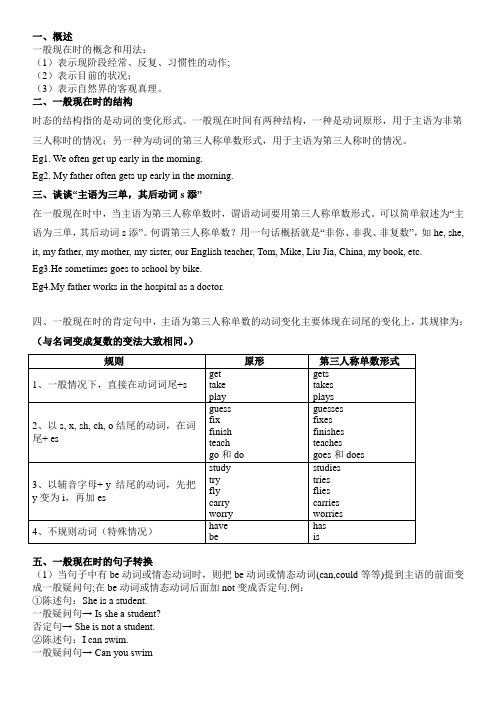
一、概述一般现在时的概念和用法:(1)表示现阶段经常、反复、习惯性的动作;(2)表示目前的状况;(3)表示自然界的客观真理。
二、一般现在时的结构时态的结构指的是动词的变化形式。
一般现在时间有两种结构,一种是动词原形,用于主语为非第三人称时的情况;另一种为动词的第三人称单数形式,用于主语为第三人称时的情况。
Eg1. We often get up early in the morning.Eg2. My father often gets up early in the morning.三、谈谈“主语为三单,其后动词s添”在一般现在时中,当主语为第三人称单数时,谓语动词要用第三人称单数形式。
可以简单叙述为“主语为三单,其后动词s添”。
何谓第三人称单数?用一句话概括就是“非你、非我、非复数”,如he, she, it, my father, my mother, my sister, our English teacher, Tom, Mike, Liu Jia, China, my book, etc.Eg3.He sometimes goes to school by bike.Eg4.My father works in the hospital as a doctor.四、一般现在时的肯定句中,主语为第三人称单数的动词变化主要体现在词尾的变化上,其规律为:(与名词变成复数的变法大致相同。
)五、一般现在时的句子转换(1)当句子中有be动词或情态动词时,则把be动词或情态动词(can,could等等)提到主语的前面变成一般疑问句;在be动词或情态动词后面加not变成否定句.例:①陈述句:She is a student.一般疑问句→ Is she a student?否定句→ She is not a student.②陈述句:I can swim.一般疑问句→ Can you swim否定句→ I can not swim.(2)当句子中即没有be动词,也没有情态动词时,则在主语前加助动词do (you,以及复数), does(单数she,he,it)变成一般疑问句;在主语后谓语动词前加助动词don’t(I,you,以及复数), doesn’t(单数she,he,it)变成否定句,助动词后的动词要变成动词原形。
(完整版)一般现在时的讲解及练习题
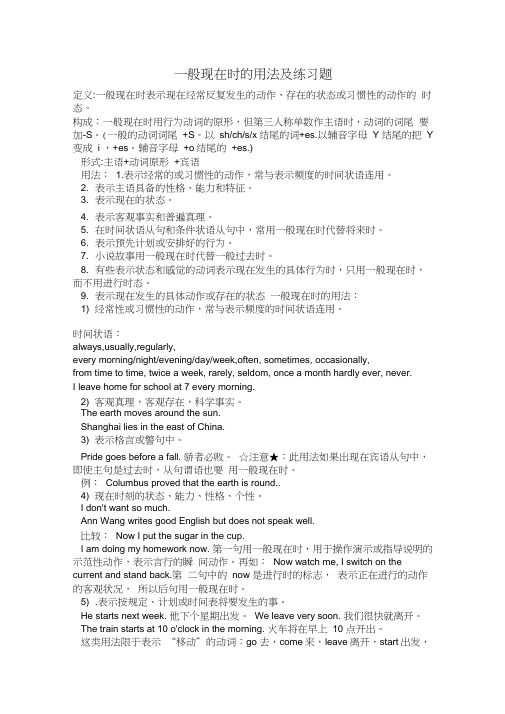
一般现在时的用法及练习题定义:一般现在时表示现在经常反复发生的动作、存在的状态或习惯性的动作的时态。
构成:一般现在时用行为动词的原形,但第三人称单数作主语时,动词的词尾要加-S。
(一般的动词词尾+S。
以sh/ch/s/x结尾的词+es.以辅音字母Y 结尾的把Y 变成i ,+es。
辅音字母+o结尾的+es.)形式:主语+动词原形+宾语用法: 1.表示经常的或习惯性的动作,常与表示频度的时间状语连用。
2. 表示主语具备的性格、能力和特征。
3. 表示现在的状态。
4. 表示客观事实和普遍真理。
5. 在时间状语从句和条件状语从句中,常用一般现在时代替将来时。
6. 表示预先计划或安排好的行为。
7. 小说故事用一般现在时代替一般过去时。
8. 有些表示状态和感觉的动词表示现在发生的具体行为时,只用一般现在时,而不用进行时态。
9. 表示现在发生的具体动作或存在的状态一般现在时的用法:1) 经常性或习惯性的动作,常与表示频度的时间状语连用。
时间状语:always,usually,regularly,every morning/night/evening/day/week,often, sometimes, occasionally,from time to time, twice a week, rarely, seldom, once a month hardly ever, never.I leave home for school at 7 every morning.2) 客观真理,客观存在,科学事实。
The earth moves around the sun.Shanghai lies in the east of China.3) 表示格言或警句中。
Pride goes before a fall. 骄者必败。
☆注意★:此用法如果出现在宾语从句中,即使主句是过去时,从句谓语也要用一般现在时。
例:Columbus proved that the earth is round..4) 现在时刻的状态、能力、性格、个性。
- 1、下载文档前请自行甄别文档内容的完整性,平台不提供额外的编辑、内容补充、找答案等附加服务。
- 2、"仅部分预览"的文档,不可在线预览部分如存在完整性等问题,可反馈申请退款(可完整预览的文档不适用该条件!)。
- 3、如文档侵犯您的权益,请联系客服反馈,我们会尽快为您处理(人工客服工作时间:9:00-18:30)。
一般现在时三单动词的变化规则及练习题
1.一般情况下,直接加-s 2.以s. x. sh. ch. o结尾,加-es 3.以“辅音字母+y”结尾,变y为i, 再加-es
一、写出下列动词的第三人称单数
drink ________ go _______ stay ________ make ________ look
_________ have_______ pass_______ carry ____ come________ watch______ sing_______ fly ________ study_______ brush________ do_________ teach_______
二、用括号内动词的适当形式填空。
1. He often ________(have) dinner at home.
2. Daniel and Tommy _______(be) in Class One.
3. We _______(not watch) TV on Monday.
4. Nick _______(not go) to the zoo on Sunday.
5. What _______they often _______(do) on Sundays?
6. _______ your mother _______(read) newspapers every day?
7. Mike _______(like) cooking. 8. I _______(be) ill. I'm in bed.
9. Liu Tao _______(do) not like PE. 10. The child often
_______(watch) TV in the evening.
三、按照要求改写句子
1. He watches TV every evening.(改为否定句)
___________________________________________________
2. I do my homework every day.(改为一般疑问句,作否定回答)
________________________________________________
1
3. She likes books.(改为一般疑问句,做肯定回答)
_______________________________________________________ 4. Amy likes playing computer games.(改为一般疑问句,作否定回答) ________________________________________________________ 5. We go to school on Sundays.(改为否定句)
_______________________________________________________
四、改错(划出错误的地方,将正确的写在横线上)
1. Is your brother like English? __________________
2. Does he likes swimming? __________________
3. He likes play games. __________________
4. She don't do her homework on Sundays. _________________
五、把句子补充完整。
1.I usually____________________(帮助我的爸爸)
2.I usually_________________________(打篮球)on Sundays.
3.She often____________________________(骑她的自行车)
4.He always_______________________________(做他的家庭作业
根据要求改写句子(1)
1.My seat is near the window. (划线提问)
2
2. Her brother is a driver. (划线提问)
3.Tom likes music and playing football. (划线提问)
4.The shirt is white. (划线提问)
5.Jim is good at English. (划线提问)
6.He does well in English and maths. (改为否定句)
7.Mike runs as fast as Ben. (改为一般疑问句,否定回答)
8.Are they American girls? (改为单数)
9.Don't go along(沿着) this street. (改为肯定句)
10.David is my classmate. (划线提问)
11.Turn right at the first crossing(第一个路口). (改为否定句)
(划线提问)12.My maths books are on the sofa.
3
13.There is my school. (改为一般疑问句,肯定回答)
14.These are his story books. (改为单数)
15.My pencil-case is on the bed. (划线提问)
根据要求改写句子(2)
16.I am from China. (划线提问)
17.That coat is fifty yuan. (划线提问)
18.I am from America. (改为一般疑问句,否定回答)
19.It's hot in summer. (划线提问)
20.Tom's sister's name is Mary. (划线提问)
21.I get to the shopping centre (购物中心)by bus. (划线提问)
22.It always rains in summer there. (改为一般疑问句,肯定回答)
(划线提问)'23.Its cold in winter there.
4
24.I like fruit (水果)best. (改为否定句)
25.Su Yang is asking Ben some questions(问题). (划线提问)
26.They are going to see a film (电影)tomorrow. (划线提问)
27.I like singing and dancing. (改为否定句)
28.He often cleans his bedroom. (改为一般疑问句)
29.Wnag Bing is heavier (重的)than Gao Shan. (划线提问)
30.Liu Tao is watering flowers in the garden. (划线提问)
31.David and Mike are going to plant trees. (划线提问)
32.Tom jumps as far as Mike. (改为否定句)
33.It is hot in summer in New York. (划线提问)
34.She is an English girl. (改为复数)
5
35.They are our women doctors. (改为单数)
36.Mary can fly. (改为一般疑问句,否定回答)
37.Ilike playing football. (改成第三人称单数,he)
38.He has a brother. (改为一般疑问句)
39.He does well in Chinese. (改为同义句)
40.My books are on the bookshelf(书架). (划线提问)
41. She does housework at the weekends. (改为否定句)
42. The policeman caught the thief. (改为一般疑问句,作否定回答)
43. I like collecting stamps and singing. (改为否定句)
44. I am a student . (改为一般疑问句)
45. I see a man behind me. (改为一般过去时)
6。
